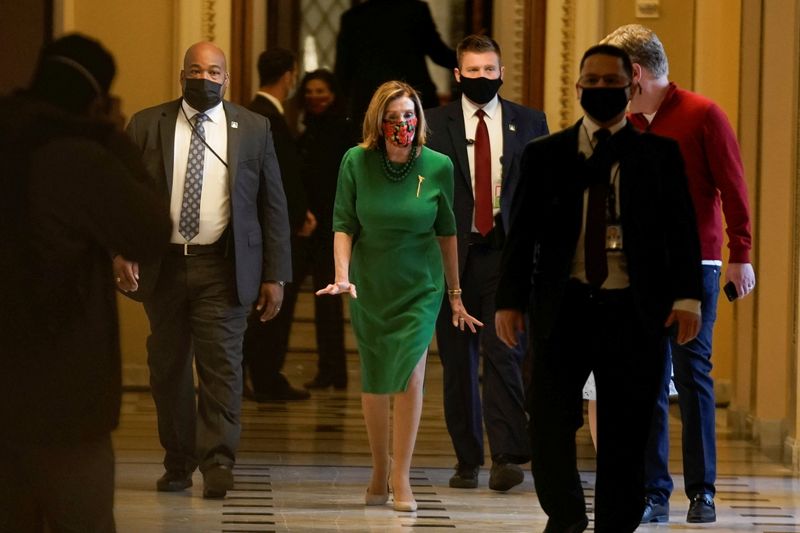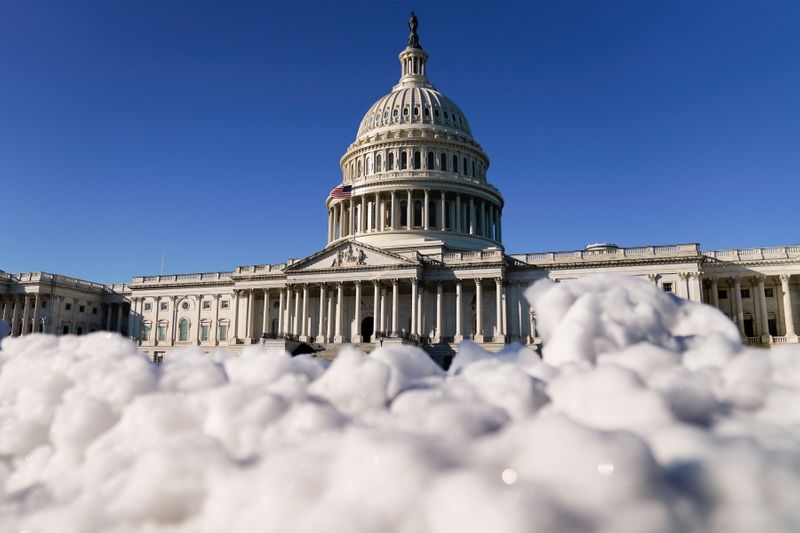By Richard Cowan and Andy Sullivan
WASHINGTON (Reuters) -The U.S. House of Representatives on Monday began debate on a $900 billion coronavirus aid package meant to stimulate a pandemic-hit economy, which the leaders of both chambers of Congress aimed to pass in a marathon session.
The White House-backed bill includes $600 payments to most Americans as well as additional payments to the millions of people thrown out of work during the COVID-19 pandemic, just as a larger round of benefits is due to expire on Saturday.
The House of Representatives is expected to vote sometime Monday evening.
Senate Majority Leader Mitch McConnell told reporters at the Capitol that passage of the legislation in the Senate will "probably be late but we're going to finish tonight."
At 5,593 pages, the wide-ranging bill that also spends $1.4 trillion on an array of federal programs through next September, is likely to be the final major piece of legislation for the 116th Congress that expires on Jan. 3.
It has a net cost of roughly $350 billion for coronavirus relief, McConnell said, adding that more than $500 billion in funding comes from unspent money Congress had authorized.
The stimulus package, the first Congress-approved aid since April, comes as the pandemic is accelerating in the United States, infecting more than 214,000 people every day and slowing the economic recovery. More than 317,000 Americans have died.
The legislation also expands a small-business lending program by about $284 billion and steers money to schools, airlines, transit systems and vaccine distribution.
The small business loan and grant program, known as the Paycheck Protection Program, would exclude publicly traded companies from eligibility.
Amid reports that the Trump Organization received past aid, the bill contains disclosure requirements for the president, vice president, heads of Cabinet departments, lawmakers and spouses and prohibits those individuals from receiving loans in the future.
State and local governments, which are struggling to pay for the distribution of newly approved COVID-19 vaccines, would receive $8.75 billion from Washington, with $300 million of that targeted at vaccinations in minority and high-risk populations.
Over $22 billion would be dedicated to expanded testing, contact tracing and other activities to corral the highly contagious coronavirus, with nearly $20 billion in new funding to help in the manufacture and procurement of vaccines, therapeutics and related supplies through the Biomedical Advanced Research and Development Authority.
For those struggling to make rental payments because of widespread layoffs due to the pandemic, a moratorium on evictions would be extended through January and $25 billion would be made available to families struggling to stay in their homes, according to a summary of the legislation.
Parents working at home during the pandemic would be allowed to carry over unused flexible spending account money for children's daycare and other expenses for the next two years.
SCRAPPED STICKING POINTS
The deal, worked out in a rare weekend session of Congress, omits the thorniest sticking points, which included Republicans' desire for a liability shield to protect businesses from coronavirus-related lawsuits and Democrats' request for a large outlay of money for cash-strapped state and local governments.
McConnell, interviewed by Fox News, pledged to renew his drive for the protections against corporate lawsuits in whatever coronavirus aid bill the incoming Biden administration pursues in early 2021.
A last-minute dispute over emergency-lending programs administered by the Federal Reserve was also resolved late on Saturday night.
The measure is far less than the $3 trillion called for in a bill that passed the Democratic-controlled House of Representatives in May, which the Republican-controlled Senate ignored.
House Speaker Nancy Pelosi opened debate on the compromise version by predicting fast passage on Monday and calling it "a good bipartisan bill."
Even so, she chastised Republicans for blocking a bigger injection of federal funds to state and local governments whose revenues have dwindled during the pandemic, even as they deal with unusual demands upon their public health workers and first responders.
"This is a big mistake," Pelosi said, adding, "How could it be that we only have $160 billion for state and local (governments) but we have approaching $1 trillion" for a small business loan and grant program, including money appropriated earlier this year to the Paycheck Protection Program.
'HELP IS ON THE WAY'
President-elect Joe Biden, a Democrat, has urged Congress to consider further stimulus for him to sign into law when he takes office on Jan. 20. "My message to everyone out there struggling right now, help is on the way," he said in a statement.
Without action by midnight (0500 GMT Tuesday), an array of federal agencies would run out of money and would have to begin furloughing workers and scaling back programs.

The bill would be the second-largest stimulus package in U.S. history, behind the approximately $2 trillion aid bill passed in March. Experts said that money played a critical role as social-distancing measures shuttered wide swaths of the economy.
